Pandora-ready Internet tuner costs $105
May 10, 2010 — by Eric Brown — from the LinuxDevices Archive — 87 viewsGrace Digital Audio is shipping a Linux-based Internet tuner that offers Pandora access and costs only $105. The Solo Wi-Fi Receiver provides over 50,000 radio stations, podcasts, and on-demand programs over its 802.11b/g WiFi receiver, runs on two Watts of power, and according to one early DigitalGuru review, is “heartily” recommended as “a great little device at a very affordable price.”
The Solo Wi-Fi Receiver does not include an amplifier or speakers of its own, but can connect to a home stereo or external powered speakers. Available with an IR-based remote control that supports up to 10 preset stations, the device can also be controlled remotely via an Apple iPhone or iPod Touch, Grace Digital Audio says.
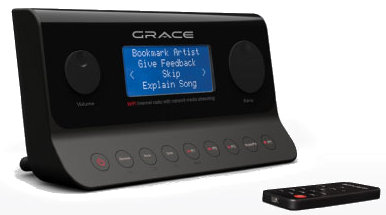
Solo Wi-Fi Receiver
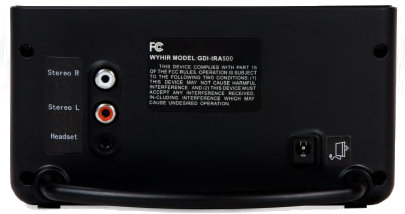
Solo Wi-Fi Receiver, rear view
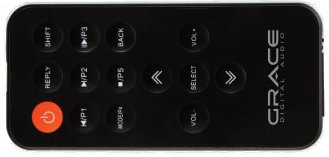
The Solo's remote control offers 10 presets.
- Audio — AIFF, AIFC, WAVE, CAF, NeXT, ADTS, MP3, AAC, Ogg Vorbis, FLAC, WMA
- Playlist — ASX, M3U, PLS
- Streaming — HTTP, HTTPS, RTSP, WSMP, Shoutcast
The Solo Wi-Fi Receiver offers more than 18,000 radio stations, as well as more than 35,000 additional podcast and on-demand programs, says Grace. As with other Grace Digital Audio Internet radios, the device provides access to the company's integrated website, based on Reciva.com, which enables users to search, delete, and add radio stations from one's computer directly to the radio.
The Solo Wi-Fi Receiver supports the following Internet music stations, all of which are free except where noted:
- Grace (Reciva.com)
- Pandora (free or premium)
- Live365 (free or VIP)
- Premium Sirius ($3 per month with subscription)
- CBS Radio
- iHeartRadio
- MP3tunes
- NPR
- NOAA
Inside the box …
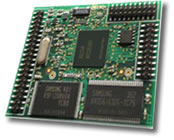 No details about the Solo Wi-Fi receiver's underlying hardware and software were released, but all Reciva-compatible "radios" sold to date — including models from Acoustic Energy, Grace, Logik, Oxx, Revo, Sangean, Sanyo, and others — have relied on one of two tiny SBCs (single board computers) manufactured by Reciva itself. The "Barracuda" (right), which measures 2.36 x 1.77 inches (60 x 45mm) is compatible only with Internet radio, while the pin-compatible "Stingray" (below) measures 3.34 x 1.81 inches (85 x 46mm), adding FM and DAB (digital audio broadcasting) receivers.
No details about the Solo Wi-Fi receiver's underlying hardware and software were released, but all Reciva-compatible "radios" sold to date — including models from Acoustic Energy, Grace, Logik, Oxx, Revo, Sangean, Sanyo, and others — have relied on one of two tiny SBCs (single board computers) manufactured by Reciva itself. The "Barracuda" (right), which measures 2.36 x 1.77 inches (60 x 45mm) is compatible only with Internet radio, while the pin-compatible "Stingray" (below) measures 3.34 x 1.81 inches (85 x 46mm), adding FM and DAB (digital audio broadcasting) receivers.
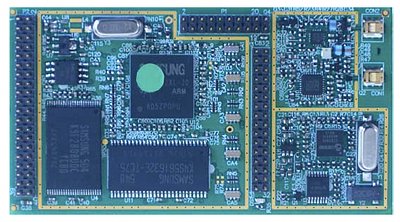
Reciva's Stingray plays Internet radio, FM, and DAB broadcasts
(Click to enlarge)
Reciva discloses few details of its hardware or software, but according to the Sharpfin Project, a group of hobbyists engaged in disassembling and analyzing Reciva-based radios, the Barracuda uses a Samsung S3C2410 processor clocked at 202.8MHz, and also incorporates an Atmel Tiny 12 microcontroller. The operating system, meanwhile, is said to be Familiar Linux, a Debian derivative.
According to Reciva, the Stingray and Barracuda include support for SD card readers and a USB host port, the latter being used to add networking capabilities. The company says the SBCs also support graphical LCD and OLED (organic light-emitting diode) displays, though all Reciva radios seen to date have used single- or multiple-line character displays.
Review: "A great little device"
The DeviceGuru review is also a how-to, showing readers h ow to set up the Solo Wi-Fi Receiver as a whole-house Internet audio tuner. Much of the story focuses on the operation of the iPod Touch app, which author Rick Lehrbaum concludes is "decent, but could be better." He also wishes the player had better UPnP audio streaming support, although he notes that it's superior to that offered by some Internet radio equipment, including the high-end Sonos Zoneplayer 90 (pictured).
ow to set up the Solo Wi-Fi Receiver as a whole-house Internet audio tuner. Much of the story focuses on the operation of the iPod Touch app, which author Rick Lehrbaum concludes is "decent, but could be better." He also wishes the player had better UPnP audio streaming support, although he notes that it's superior to that offered by some Internet radio equipment, including the high-end Sonos Zoneplayer 90 (pictured).
On the plus side, DeviceGuru likes the Solo Wi-Fi Receiver's "integrated favorites" function, which aggregates both general radio content and Pandora channels. The review also lauds the ability to organize these radio favorites online at Reciva.com. Most importantly, however, Lehrbaum praises the smooth operation, low price, and low power consumption, which he says is only one-sixth of that of the Zoneplayer 90.
Availability
The Solo Wi-Fi Receiver is available for $125 at GraceDigitalAudio.com, and can be had for a mere $105 at Amazon, here.
The device should be available in Best Buy, select Sears stores, and regional consumer electronics stores starting in July, says the company. More information and links to direct sales may be found here.
More information on the Barracuda and Stingray may be found on the Reciva website, here.
This article was originally published on LinuxDevices.com and has been donated to the open source community by QuinStreet Inc. Please visit LinuxToday.com for up-to-date news and articles about Linux and open source.